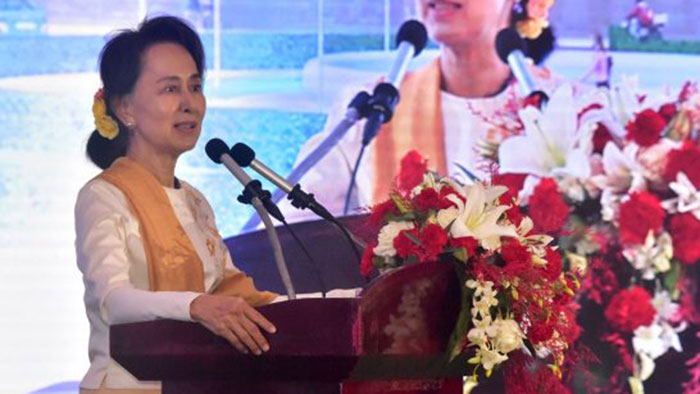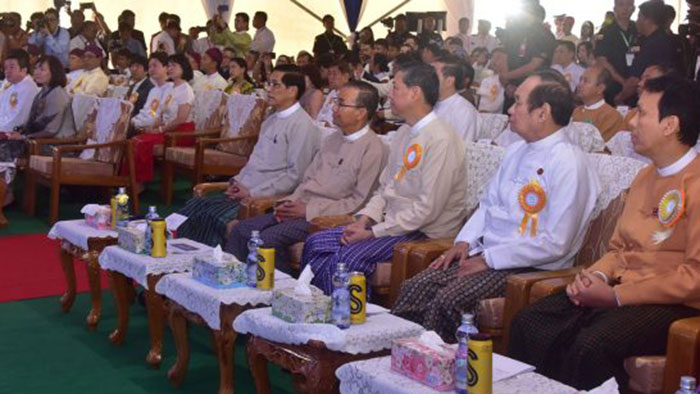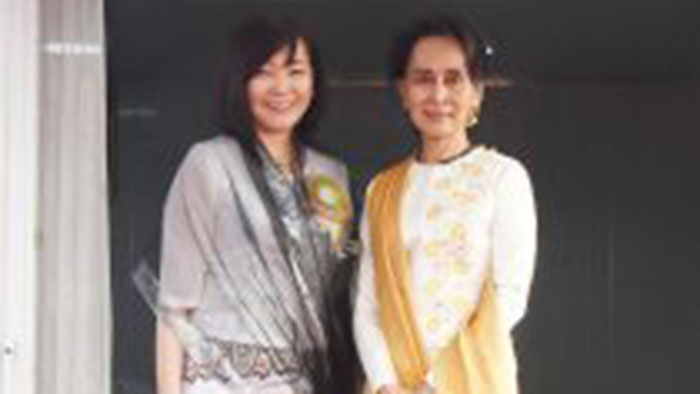Date: December 29, 2019


A ceremony to launch construction of Shin Rai International Vocational Institute was held at Laydaukkan (South) in Dagon Myothit (South) Township in Yangon Region yesterday, in the presence of State Counsellor Daw Aung San Suu Kyi and Mrs Akie Abe, wife of Japanese Prime Minister Shinzo Abe.
It was also attended by Union ministers U Min Thu, U Ohn Win, Dr Myo Thein Gyi, Dr Myint Htwe, Yangon Region Chief Minister U Phyo Min Thein, members of the Yangon Region cabinet, MPs, Ambassador of Japan Mr Ichiro Maruyama, officials of the Shin Rai Company Ltd and invited guests.
Speaking at the event, State Counsellor Daw Aung San Suu Kyi said, “We can say that this stake driving ceremony is not only for a vocational institute, but also for the education of our country. Because our country is in dire need of vocational skills and systems. And not just for our country, but for the world, as well.
“The world has come to see that education is not just for graduation, because there are many graduates who have no jobs throughout the world. Hence, we have to think about how to match education and jobs. I have decided to build our country’s education system with vocational training institutes and departments.
“When it comes to making decisions about our education, we have to think about our country’s strong points. In other words, lagging behind in development can be considered our strong point. Because developed countries have encouraged university education, and it is not easy for them to turn to a system which encourages technological skills. Our country has many requirements in the education sector, so we can establish the education system correctly. Technology is also knowledge and wisdom. Vocational skills are also knowledge and wisdom. I have said repeatedly that wisdom and knowledge can promote our capacity to tackle the challenges in our lives.
“If the education we acquired was not enough to tackle the challenges, the education we acquired remained in books and did not benefit our lives or our surroundings. Hence, we have encouraged the vocational education system and technology. In some developed countries in the world, university education systems and vocational education systems are working together, in parallel. We can not say which one is higher or lower. These two systems are much respected, encouraged and trusted by the people, students and parents in those countries. Why? Because their vocational educational holds the same value as their university education.
“I would like to encourage the parents of our youths. We are building a system which can join education and jobs, and parents are requested to encourage this system. I am also delighted to see their encouragement, and it has also been seen that youths are willing to attend vocational education. This is also the right stand, because they want to get jobs after their educations. After their education, they want to stand on their own feet to support their families and parents, whom they owe gratitude. Hence, it is becoming important to get a job after their education is completed. We are very delighted to see this and to continue to encourage it.

State Counsellor Daw Aung San Suu Kyi holds talk with Mrs Akie Abe, wife of Japanese Prime Minister Shinzo Abe. Photo:MNA
“Today, I would like to express special thanks to the wife of the Japanese Prime Minister.”
“Japan is a country which encourages vocational education systems, along with technology. As you know, it is not wrong if we say that Japan is the most developed country in Asia. That’s why, we thank all our friends who pragmatically encourage this kind of educational system. As a good friend, Japan fulfilled our needs after making thorough observations.
In our country or in other countries, there were foreign donors. Some made their donations based on their views and opinions. But, some made donations after observations, in an effort to find the needs of a receiver. Both are good, but the latter is the most valuable deed. Hence, I would like to express thanks, again, to all of our friends who fulfilled our needs. This need would be helpful, not only for our current needs, but also for the future of our country.
“When we build the future of our country, we need a farsightedness view. I have to learn from the experiences of other countries and take lessons from them.
But, one country is not the same as another. There are differences between them. Therefore, we need to learn the needs of our country, and think and bravely decide to fulfil these needs.
“As I said earlier, there are advantages and disadvantages for a country which lagged behind in development. We know the dos and don’ts. Our government encourages vocational education. Therefore, not only the government, but also the private sector and outside donors are required to encourage this effort. Because, it will take time if only the government implements this policy. But we can’t wait for a long time. We need to speed up our efforts to catch up to other countries which are ahead of ours.
“I have noticed today that there are many students in the crowd who welcomed us. Another point is that in our country’s population, the number of youths makes up a higher percentage than older ones. This reflects that our country is in the hands of the youths.
“Your people values education and I much appreciate it. The country which loves education will certainly become developed.”
“We will have to face difficulties, and we must try to overcome them. We must have endurance. But we have the advantage as we have the desire to love and value knowledge.
“Our people love knowledge, and it is one of our traditions. Since childhood we have been taught to pursue education and respect it. Parents and teachers are included in the Five Anando Ananda or the Five Infinite Venerables. As they educate us, we owe immeasurable gratitude to them. When we mediate, first we dispense metta to ourselves and then to the persons to whom we owe gratitude and they include our teachers. We all understand the self-dispensing of metta. From there, we will understand how other people also want peace and happiness. And then we dispense metta to the persons including teachers we owe gratitude to show how much we value and thank them. It is easy to dispense metta for them. If we concentrate our mind on this matter, we can measure the degree of graduate we owe to them.

State Counsellor Daw Aung San Suu Kyi and Mrs Akie Abe, wife of Japanese Prime Minister Shinzo Abe, pose for a documentary photo. Photo: MNA
“The respects-paying ceremony is one of the still remaining fine traditions of our country. Annual respects-paying ceremonies are our unique culture. In fact it is a ceremony in which we show our respects to the wisdom and our teachers. In fact, we also owe gratitude to the education centres, education schools and persons who develop infrastructures, apart from our teachers. They provide us education and collective support in pursuing knowledge. We participate in the groundbreaking ceremony to thank the persons who will benefit the posterity. It’s indeed a privilege and pleasure for me.
“Now I want you to explain the relationship between the economic and education systems. This relationship is very close to technology and vocational education. There will be success only if there is connection between economic system and the education system of a country. Business will meet with success if the education system develops the knowledge required by the economic sector.
“We are still an agro-based country. Agriculture has flourished in our country since long ago. We need much technology for our country’s agriculture system to meet the current age. We can modernize and develop our age-old agriculture system through the use of advanced technology. We are happy to know that the school that will be opened by Shin Rai includes technological lessons.
“Moreover, the inclusion of foreign language courses will broaden the scope of our domain. It will create a global connection, apart from local contacts for us. In this regard, I am so glad that technologies that meet the modern age will be taught, and it is our aspiration. Another point is social relations. It’s a pleasure for me to know that the knowledge of the relations between our friends and would-be friends will be imparted. Social relations cannot be taught only at schools.
“Parents are the primary teachers. Schools will develop the social relations we have learnt from our society.
“A friend once suggested me to teach moral subjects and to pay attention to mental development at schools. I told him that I was trying. Now we have included the Civics in the school curriculum. We were taught civics during our childhood days. But later, it was removed from the curriculum for many years. Sometimes, I was thinking “It was removed because it was no more needed or because of the fear to deal them highly intellect people”. Civics was not taught for many years. But now it is included in the school curriculum again. Basically, civics teaches every citizen his individual rights and responsibilities.
“For example, students of good schools have advantages. But there are advantages as well as responsibilities to retain the school’s reputation. Students have the duty to use the advantages of the schools to gain knowledge. Civics has taught the whole country the mutual relations between rights and responsibilities. In fact, it is what we call social relations. It is based on give and take. Only fair compromises and concessions can be called social relations. I am happy to know that the school curriculum includes social relations. I hope lessons will include making fair compromises and concessions internally and internationally.
“Not only officials from the Ministry of Education but also from the Ministry of Health and the Ministry of Natural Resources and Environmental Conservation are attending this ceremony. It shows the dimension of knowledge as it is related to both the health and environmental conservation. Their integration means development for the whole country. So, once again, I would like to express thanks to all the friends and distinguished guests at this ceremony, and invite your ongoing collective assistance to develop the country and improve the education sector. With this I conclude. Thank you.”


Then State Counsellor Daw Aung San Suu Kyi, Mrs. Akie Abe and Chief Minister of Yangon Region U Phyo Min Thein drove the stakes at the site where Shin Rai International Vocational Institute will be built.
State Counsellor Daw Aung San Suu Kyi, Mrs. Akie Abe, Union Ministers and the Chief Minister , the Japanese Ambassador and attendees posed for group documentary photos.
At the tree planting ceremony, State Counsellor Daw Aung San Suu Kyi planted a mango, Mrs. Akie Abe a cherry, Union Minister Dr. Myo Thein Gyi a gangaw, Chief Minister U Phyo Min Thein a gangaw and Mr. Yoshie of Shin Rai company a cherry at the respective spots.
State Counsellor Daw Aung San Suu Kyi and Mrs. Akie Abe held talks at a separate meeting, and posed for documentary photos.
The Shin Rai International Vocational Institute project will be implemented on a 23.5-acre land plot in Laydaunkkan (South) Ward, Dagon Myothit (South), Yangon Region in three phases. The implementation of phase -1 begins in early 2020.
Would-be teachers of the school will be sent to Finland for further studies, and the students who complete the courses at the school will get the certificate from Finland.The candidate section system of the school will prioritize students from ethnic areas. It will also accept students from other States and Regions. – MNA (Translated by AMS, TMT)
Useful Websites
Government Websites
UNITED NATIONS WEBSITES
- http://www.un.org
- https://unog.ch/
Quick Links
- President Office
- State Counsellor Office
- Ministry of foreign Affairs
- Ministry of Immigration and Population
- Ministry of Hotels and Tourism
UMFCCI - Travel Information
